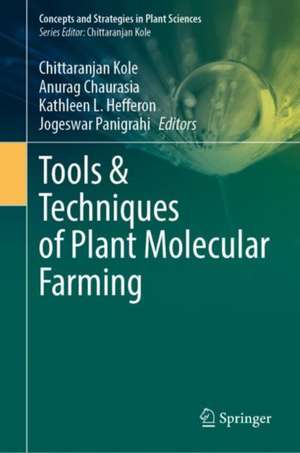Tools & Techniques of Plant Molecular Farming: Concepts and Strategies in Plant Sciences
Editat de Chittaranjan Kole, Anurag Chaurasia, Kathleen L. Hefferon, Jogeswar Panigrahien Limba Engleză Hardback – 23 noi 2023
The book deep dives into recent extraction and downstream processing methodologies, its co-existence with conventional agriculture, global governance and finally opportunities, challenges, and future perspectives in plant molecular farming.
It focuses on plastid/chloroplast transformation (transplastomics) and its application in plant molecular farming. The books highlight recent advances in genome editing, synthetic biology, glycosylation and glyco-engineering for improved plant molecular farming by marker-free andtissue-specific systems via cisgenic and transgenic crops. In depth discussions on biosafety issues and bio-containment strategies have also been included.
The book has 15 chapters authored by globally leading experts on the subject, presenting opportunities & challenges for bio-industrial researchers and entrepreneurs. It is useful to researchers, industrialists, entrepreneurs, policy planners, academician, and students across the disciplines.
Preț: 1392.65 lei
Preț vechi: 1698.34 lei
-18% Nou
Puncte Express: 2089
Preț estimativ în valută:
266.52€ • 277.22$ • 220.03£
266.52€ • 277.22$ • 220.03£
Carte tipărită la comandă
Livrare economică 14-28 aprilie
Preluare comenzi: 021 569.72.76
Specificații
ISBN-13: 9789819948581
ISBN-10: 9819948584
Pagini: 411
Ilustrații: XV, 411 p. 1 illus.
Dimensiuni: 155 x 235 mm
Greutate: 0.78 kg
Ediția:1st ed. 2023
Editura: Springer Nature Singapore
Colecția Springer
Seria Concepts and Strategies in Plant Sciences
Locul publicării:Singapore, Singapore
ISBN-10: 9819948584
Pagini: 411
Ilustrații: XV, 411 p. 1 illus.
Dimensiuni: 155 x 235 mm
Greutate: 0.78 kg
Ediția:1st ed. 2023
Editura: Springer Nature Singapore
Colecția Springer
Seria Concepts and Strategies in Plant Sciences
Locul publicării:Singapore, Singapore
Cuprins
Preface.- About the Editors.- List of Contributors.- Foreword.- Chapter 1 Plant Molecular Farming: Concept and Strategies.- Chapter 2 Plant Molecular Pharming: Opportunities, Challenges and Future Perspectives.- Chapter 3 Improving Plant Molecular Farming Via Genome Editing.- Chapter 4 Recent Genome Editing Tools Assisted Plant Molecular Farming.- Chapter 5 Seed-Based Production System for Molecular Farming.- Chapter 6 Seed-Based Production of Recombinant Proteins.- Chapter 7 Plant-Based Antibody Manufacturing.- Chapter 8 Turnip Mosaic Virus Nanoparticles: A Versatile Tool in Biotechnology.- Chapter 9 Targeting Chloroplasts for Plant Molecular Farming.- Chapter 10 Plant Molecular Farming for Developing Countries: Current Status and Future Perspectives.- Chapter 11 Plant Molecular Farming: A Boon for Developing Countries.- Chapter 12 Plant Molecular Pharming: A Promising Solution for COVID-19.- Chapter 13 Biopharming's Growing Pains.- Chapter 14 Biosafety, Risk Analysis and Regulatory Framework for Molecular Farming in Europe.- Chapter 15 Deep and Meaningful: An Iterative Approach to Developing an Authentic Narrative for Public Engagement for Plant Molecular Technologies in Human and Animal Health.
Notă biografică
Prof. Chittaranjan Kole is an internationally reputed scientist with an illustrious professional career spanning over thirty-eight years and original contributions in the fields of plant genomics, biotechnology and molecular breeding
Dr. Anurag Chaurasia, a biotechnologist working with the Indian Council of Agricultural Research (ICAR) Government of India,
Prof. Kathleen L. Hefferonreceived her PhD from the University of Toronto, and is currently a Faculty in the Department of Microbiology, Cornell University.
Prof. (Dr.) Jogeswar Panigrahi completed his PhD degree from Utkal University, and presently working as Professor and Head of PG Department of Biotechnology, Berhampur University.
Dr. Anurag Chaurasia, a biotechnologist working with the Indian Council of Agricultural Research (ICAR) Government of India,
Prof. Kathleen L. Hefferonreceived her PhD from the University of Toronto, and is currently a Faculty in the Department of Microbiology, Cornell University.
Prof. (Dr.) Jogeswar Panigrahi completed his PhD degree from Utkal University, and presently working as Professor and Head of PG Department of Biotechnology, Berhampur University.
Textul de pe ultima copertă
This edited book is an in-depth compilation of recent tools and techniques, concepts and strategies used globally in plant molecular farming (PMF) for the cost-effective bulk production of recombinant proteins, secondary metabolites, and other biomolecules. The book presents an overview of success stories of PMF applications from developing countries to address poverty, achieve zero hunger, good health and well-being, thus achieving the UN SDGs 1, 2, and 3.
The book deep dives into recent extraction and downstream processing methodologies, its co-existence with conventional agriculture, global governance and finally opportunities, challenges, and future perspectives in plant molecular farming.
It focuses on plastid/chloroplast transformation (transplastomics) and its application in plant molecular farming. The books highlight recent advances in genome editing, synthetic biology, glycosylation and glyco-engineering for improved plant molecular farming by marker-free and tissue-specific systems via cisgenic and transgenic crops. In depth discussions on biosafety issues and bio-containment strategies have also been included.
The book has 15 chapters authored by globally leading experts on the subject, presenting opportunities & challenges for bio-industrial researchers and entrepreneurs. It is useful to researchers, industrialists, entrepreneurs, policy planners, academician, and students across the disciplines.
It focuses on plastid/chloroplast transformation (transplastomics) and its application in plant molecular farming. The books highlight recent advances in genome editing, synthetic biology, glycosylation and glyco-engineering for improved plant molecular farming by marker-free and tissue-specific systems via cisgenic and transgenic crops. In depth discussions on biosafety issues and bio-containment strategies have also been included.
The book has 15 chapters authored by globally leading experts on the subject, presenting opportunities & challenges for bio-industrial researchers and entrepreneurs. It is useful to researchers, industrialists, entrepreneurs, policy planners, academician, and students across the disciplines.
Caracteristici
Explores marker-free and tissue-specific systems via cisgenic and transgenic crops for plant molecular farming Highlights the use of plant seed as ideal precursor for sustainable bio-manufacturing via plant molecular farming Underlines global regulatory and ethical issues with respect to plant molecular farming











